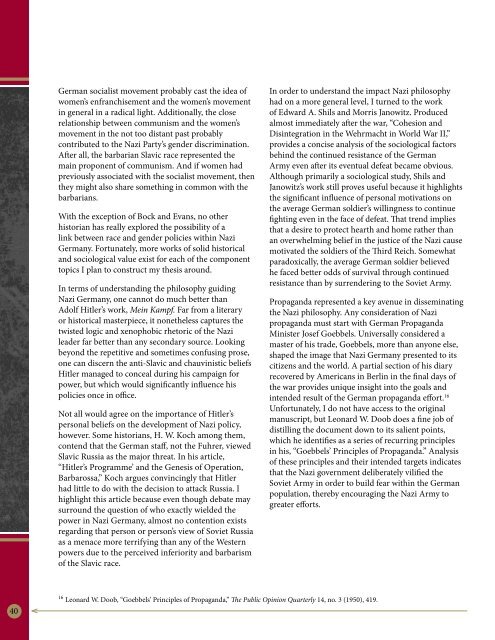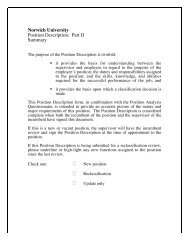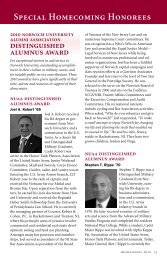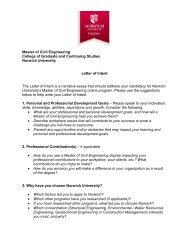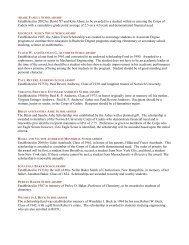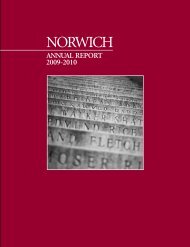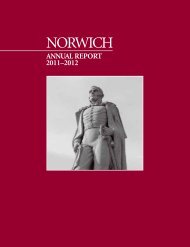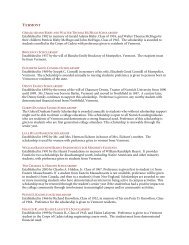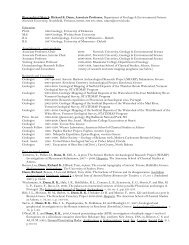Surviving Master's-Level History Programs at Norwich University: A ...
Surviving Master's-Level History Programs at Norwich University: A ...
Surviving Master's-Level History Programs at Norwich University: A ...
- No tags were found...
Create successful ePaper yourself
Turn your PDF publications into a flip-book with our unique Google optimized e-Paper software.
German socialist movement probably cast the idea ofwomen’s enfranchisement and the women’s movementin general in a radical light. Additionally, the closerel<strong>at</strong>ionship between communism and the women’smovement in the not too distant past probablycontributed to the Nazi Party’s gender discrimin<strong>at</strong>ion.After all, the barbarian Slavic race represented themain proponent of communism. And if women hadpreviously associ<strong>at</strong>ed with the socialist movement, thenthey might also share something in common with thebarbarians.With the exception of Bock and Evans, no otherhistorian has really explored the possibility of alink between race and gender policies within NaziGermany. Fortun<strong>at</strong>ely, more works of solid historicaland sociological value exist for each of the componenttopics I plan to construct my thesis around.In terms of understanding the philosophy guidingNazi Germany, one cannot do much better thanAdolf Hitler’s work, Mein Kampf. Far from a literaryor historical masterpiece, it nonetheless captures thetwisted logic and xenophobic rhetoric of the Nazileader far better than any secondary source. Lookingbeyond the repetitive and sometimes confusing prose,one can discern the anti-Slavic and chauvinistic beliefsHitler managed to conceal during his campaign forpower, but which would significantly influence hispolicies once in office.Not all would agree on the importance of Hitler’spersonal beliefs on the development of Nazi policy,however. Some historians, H. W. Koch among them,contend th<strong>at</strong> the German staff, not the Fuhrer, viewedSlavic Russia as the major thre<strong>at</strong>. In his article,“Hitler’s Programme’ and the Genesis of Oper<strong>at</strong>ion,Barbarossa,” Koch argues convincingly th<strong>at</strong> Hitlerhad little to do with the decision to <strong>at</strong>tack Russia. Ihighlight this article because even though deb<strong>at</strong>e maysurround the question of who exactly wielded thepower in Nazi Germany, almost no contention existsregarding th<strong>at</strong> person or person’s view of Soviet Russiaas a menace more terrifying than any of the Westernpowers due to the perceived inferiority and barbarismof the Slavic race.In order to understand the impact Nazi philosophyhad on a more general level, I turned to the workof Edward A. Shils and Morris Janowitz. Producedalmost immedi<strong>at</strong>ely after the war, “Cohesion andDisintegr<strong>at</strong>ion in the Wehrmacht in World War II,”provides a concise analysis of the sociological factorsbehind the continued resistance of the GermanArmy even after its eventual defe<strong>at</strong> became obvious.Although primarily a sociological study, Shils andJanowitz’s work still proves useful because it highlightsthe significant influence of personal motiv<strong>at</strong>ions onthe average German soldier’s willingness to continuefighting even in the face of defe<strong>at</strong>. Th<strong>at</strong> trend impliesth<strong>at</strong> a desire to protect hearth and home r<strong>at</strong>her thanan overwhelming belief in the justice of the Nazi causemotiv<strong>at</strong>ed the soldiers of the Third Reich. Somewh<strong>at</strong>paradoxically, the average German soldier believedhe faced better odds of survival through continuedresistance than by surrendering to the Soviet Army.Propaganda represented a key avenue in dissemin<strong>at</strong>ingthe Nazi philosophy. Any consider<strong>at</strong>ion of Nazipropaganda must start with German PropagandaMinister Josef Goebbels. Universally considered amaster of his trade, Goebbels, more than anyone else,shaped the image th<strong>at</strong> Nazi Germany presented to itscitizens and the world. A partial section of his diaryrecovered by Americans in Berlin in the final days ofthe war provides unique insight into the goals andintended result of the German propaganda effort. 16Unfortun<strong>at</strong>ely, I do not have access to the originalmanuscript, but Leonard W. Doob does a fine job ofdistilling the document down to its salient points,which he identifies as a series of recurring principlesin his, “Goebbels’ Principles of Propaganda.” Analysisof these principles and their intended targets indic<strong>at</strong>esth<strong>at</strong> the Nazi government deliber<strong>at</strong>ely vilified theSoviet Army in order to build fear within the Germanpopul<strong>at</strong>ion, thereby encouraging the Nazi Army togre<strong>at</strong>er efforts.4016Leonard W. Doob, “Goebbels’ Principles of Propaganda,” The Public Opinion Quarterly 14, no. 3 (1950), 419.


